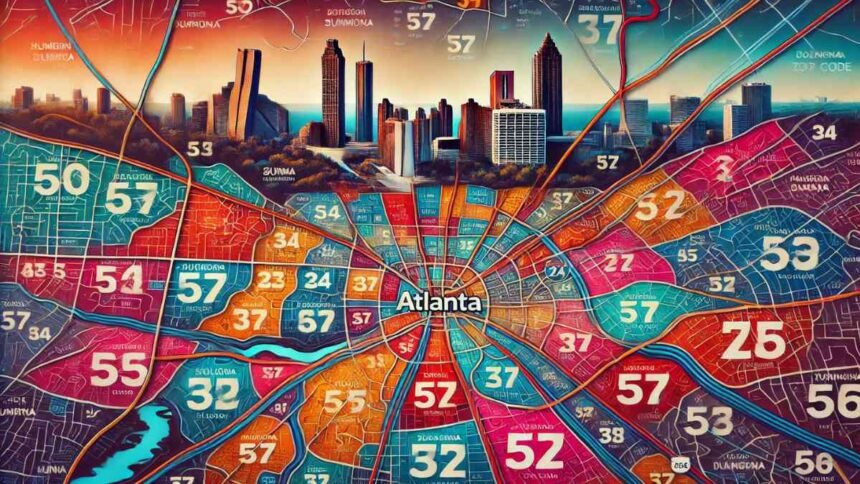Atlanta zip code spans across a diverse metropolitan area, covering everything from bustling downtown districts to quiet suburban neighborhoods. With more than 100 zip codes, Atlanta offers distinct postal zones that help residents and businesses manage their mail efficiently while reflecting the city’s geographic, cultural, and economic diversity.
Introduction
Atlanta, Georgia, is a vast and vibrant city known for its cultural diversity, economic significance, and historical importance in the southern United States. Each neighborhood and region in Atlanta has its own unique identity, which is often reflected in its zip code. Understanding the city’s postal codes is essential not only for postal services but also for navigating the local real estate market, demographic analysis, and business logistics. This guide will provide a detailed breakdown of Atlanta zip codes, including the neighborhoods they encompass and their significance to the city’s layout.
Overview of the Atlanta Zip Code System
Atlanta zip code system is a detailed network covering urban, suburban, and rural areas. With over 100 distinct zip codes, Atlanta is a city divided into various regions, each offering its own characteristics and living conditions. The zip codes serve as an essential tool for location identification, helping residents and visitors pinpoint specific areas within the metro area.
Zip codes in Atlanta often follow a general pattern where the closer you are to the city center, the smaller the zip code numbers. For example, areas like Downtown Atlanta fall within low-number zip codes such as 30303, while further suburban areas have larger numbers like 30350.
Breakdown of Key Zip Codes in Atlanta
Here is a breakdown of some of the most prominent Atlanta zip code and the neighborhoods they cover:
- 30303 – Downtown Atlanta: This zip code covers Atlanta’s downtown area, including major landmarks such as the Georgia State Capitol, Mercedes-Benz Stadium, and Centennial Olympic Park. Downtown Atlanta is a hub for business, entertainment, and tourism, making 30303 one of the most well-known zip codes.
- 30305 – Buckhead: One of the city’s wealthiest neighborhoods, Buckhead is home to upscale shopping centers, fine dining, and luxury real estate. The 30305 zip code represents this affluent area, known for its high-end boutiques, offices, and historic estates.
- 30309 – Midtown: Midtown Atlanta is the cultural heart of the city, featuring attractions such as the High Museum of Art, Piedmont Park, and the Fox Theatre. This area, located in the 30309 zip code, is a blend of residential and commercial spaces, appealing to young professionals and artists.
- 30318 – Westside: Covering areas such as West Midtown, Atlantic Station, and Riverside, the 30318 zip code is known for its industrial history and ongoing urban development. This part of Atlanta has become increasingly popular among millennials and young families due to its growing housing market and vibrant community feel.
- 30350 – Sandy Springs: Situated in Atlanta’s northern suburbs, the 30350 zip code covers parts of Sandy Springs, a suburban city known for its family-friendly atmosphere, excellent schools, and proximity to nature reserves.
Why Zip Codes Matter in Atlanta
Atlanta zip codes are more than just postal markers; they offer valuable insights into the socio-economic structure, real estate values, and community identities across the metro area. For instance, high-demand areas like Buckhead (30305) tend to have higher real estate prices, whereas more affordable housing can be found in areas such as the West End (30310).
Additionally, businesses in Atlanta strategically choose locations based on zip codes to tap into target markets. For example, tech startups may gravitate toward Midtown (30309) for its innovative environment, while retail businesses might prefer Buckhead (30305) for its affluent customer base.
Real Estate and Zip Codes: A Key Factor
For homebuyers and renters, understanding Atlanta zip code is crucial when searching for a home. Different zip codes often indicate varying property values, school districts, and access to amenities. Prospective homeowners can gauge the type of community they’re entering by the associated zip code.
Here are a few examples of zip codes and what they imply about real estate:
- 30305 (Buckhead): This area is known for luxury homes, high-end shopping, and affluent residents. Homes here tend to be on the pricier side, with access to elite schools and upscale amenities.
- 30310 (West End): Known for its historic homes and revitalization efforts, this zip code offers more affordable options, attracting both first-time buyers and investors interested in property appreciation.
- 30350 (Sandy Springs): Families seeking a suburban lifestyle often choose this zip code due to its proximity to good schools, parks, and safe neighborhoods.
Business Considerations and Atlanta Zip Codes
For businesses, selecting the right zip code in Atlanta can mean the difference between success and failure. Certain zip codes are known for their commercial activity, making them ideal for office spaces and retail stores. For example:
- 30303 (Downtown Atlanta): Ideal for businesses seeking proximity to corporate headquarters, government offices, and tourist attractions.
- 30318 (Westside): Popular among startups and tech firms due to its emerging status as a creative and industrial district.
Conclusion
Atlanta zip code system is a reflection of the city’s rich diversity, offering a unique glimpse into the characteristics of each neighborhood. Whether you’re moving to the city, setting up a business, or simply exploring, understanding Atlanta zip codes can help you navigate the metro area effectively. With a robust real estate market and a range of socio-economic landscapes, Atlanta zip code play a significant role in defining the city’s urban development and community identity.
For More Visit, Viraltimes.co.uk







